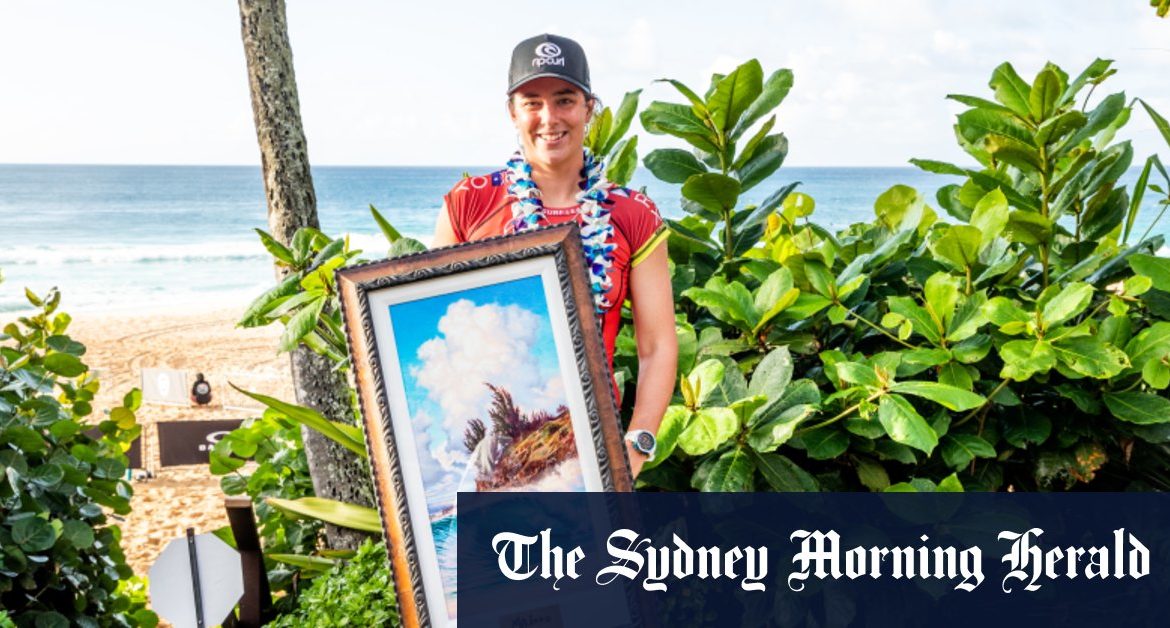Two-time world champion Tyler Wright is having a coughing fit, a standard lung infection. However, the rattling cough needs an explanation during the year of pandemic paranoia.
Hours earlier the sick surfer made history to become the first woman to take out a major title event at Pipeline at Oahu in Hawaii. The Maui Pro was Wright’s first event in two years after she contracted influenza in Africa. This was followed by chronic fatigue and ensuing emotional breakdowns.
Tyler Wright after winning the Maui Pro at Pipeline on December 20.Credit:Getty Images
Yet the triumphant comeback last week almost never took place.
On December 9 a fatal shark involving a recreational surfer near the Maui Pro site at Honolulu Bay shut down the women’s event. Three days later a COVID outbreak among World Surf League organisers, including chief executive Erik Logan, brought the men’s competition to a standstill. The ensuing chaos was dragging the sport down into a wide-eyed, open panic, and Hawaiian government officials were reluctant to sanction the resumption of the trouble-plagued events.
The stasis ended on December 17. Officials allowed the men’s and women’s events to resume, with Wright and her fellow surfers joining the men at Pipeline break for the first time.
The sport of surfing was morphing into guerilla warfare; competitors and organisers hiding out for extended periods in lockdown, self-contained small groups living in isolation, waiting for hit and run raids on the beach and always moving here and there trying to outrun the pandemic. It’s the only way the revamped competition will survive the upcoming trek through Hawaii, California, Australia, Brazil, South Africa and French Polynesia.
How did Wright keep herself together? She replies with the mantra that is often repeated: “This is my job”.
For Wright, this approach is driving her comeback. It’s just a job, albeit a great one. But just a job.
For an agonising 14 months, Wright was barely able to get out of bed and admits she has no recollection of her 25th birthday. At her worst, the surfer told 60 Minutes, she was having up to six emotional breakdowns a day.
She won her first tour event at the age of 14 in 2008 and won two world titles in 2016 and 2017, but she had been brought so low.
Loading
Wright says the fatal shark attack at Honolulu Bay near the women’s event deeply upset the competitors. She said the WSL chief executive and four staffers contracting COVID-19 rattled them even more. However, the time away from surfing gave her the resilience to deal with any setback.
“This week [with the fatal shark attack and COVID shutdown] was incredibly emotional, traumatic, stressful week all right around,” she says. “And yet, through WSL’s leadership, they were able to create an opportunity for the women to get a foot in the door at Pipeline, which we’ve never ever had before.
“I have been through enough things now to know how to take care of my mental health, to how to stay healthy, even though, obviously I got sick, but not with COVID just normal sick. But it’s just one of those things where you learn how to manage it on the way.”
Wright spent a lot of time getting her mind and body ready for this event. However, she also brought something else to her comeback: attitude and joy.

Tyler Wright eliminated fellow Australian Sally Fitzgibbons in the semi-finals.Credit:Getty Images
Earlier in the event, before it was switched from Maui to Pipeline, she scored a perfect score of 10 from the judges when competing against fellow Australian Stephanie Gilmore in a quarter-final.
Loading
Uncharacteristically, she celebrated midway through the wave after exiting a barrel ride with a joyous soul arch, the classic longboard surfing pose, performed by arching the back while riding a wave, demonstrating nonchalance and casual confidence, and she added her own stamp by sticking out her tongue in the direction of the judges. Then she resumed her engagement with the fast-moving wave, executing some arcing turns on the board rails before popping the fins out the back of the wave in another perfect section. The end of this ride was followed by further celebration with a bring-it call to arms.
During her extended layoff, Wright studied how Australian women basketballers such as Lauren Jackson and Liz Cambage carried themselves on and off the court.
“I think there’s so much more space for that in my sport and just in me in general,” she says. “You know when I’m angry in the water, I’m gonna let people know. It is what it is. Get over it. I’m not gonna hide that from anyone. If I’m stoked on something, you’ll see that, too.
“I think there’s a thing in women’s sports where you always have to be grateful, and I am, but for me that was a pure joy wave. Rarely before this point in my career have I celebrated on the wave.
“I’ve definitely never celebrated twice that’s for sure. I think it’s an important part of being in sport. I wish I saw that more when I was kid.”
Tyler Wright is back at work full-time.
Heath Gilmore is the US Votes 2020 editor.
Most Viewed in Sport
Loading







